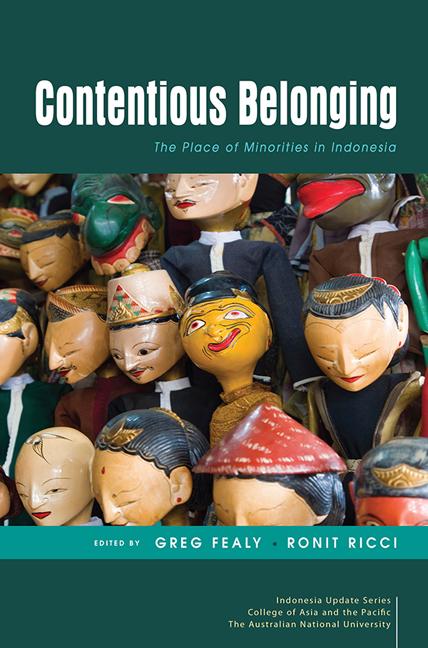Book contents
- Frontmatter
- Contents
- Tables and figures
- Contributors
- Acknowledgments
- Glossary
- Map
- 1 Diversity and its Discontents: an Overview of Minority–Majority Relations in Indonesia
- PART 1 HISTORY AND LAW
- PART 2 DISABILITY
- 5 Changing Laws, Changing Attitudes: the Place of People With Disability in Indonesia
- 6 Disability Inclusion in Indonesia: the Role of Islamic Schools and Universities in Inclusive Education Reform
- PART 3 SEXUALITY
- PART 4 RELIGION AND ETHNICITY
- PART 5 REFLECTIONS
- Index
- Indonesia Update Series
6 - Disability Inclusion in Indonesia: the Role of Islamic Schools and Universities in Inclusive Education Reform
from PART 2 - DISABILITY
Published online by Cambridge University Press: 06 September 2019
- Frontmatter
- Contents
- Tables and figures
- Contributors
- Acknowledgments
- Glossary
- Map
- 1 Diversity and its Discontents: an Overview of Minority–Majority Relations in Indonesia
- PART 1 HISTORY AND LAW
- PART 2 DISABILITY
- 5 Changing Laws, Changing Attitudes: the Place of People With Disability in Indonesia
- 6 Disability Inclusion in Indonesia: the Role of Islamic Schools and Universities in Inclusive Education Reform
- PART 3 SEXUALITY
- PART 4 RELIGION AND ETHNICITY
- PART 5 REFLECTIONS
- Index
- Indonesia Update Series
Summary
Indonesia's ratification of the United Nations Convention on the Rights of Persons with Disabilities in 2011 and the introduction of Law No. 8/2016 on People with Disabilities in 2016 require the government to shift its policy on people with disabilities from a medical- and charity-based approach to a rights-based approach. Among the many rights that are guaranteed by the Disability Law is the right for people with disabilities to receive an education (Article 5(1) and Article 10). The law requires the national government and local governments to provide accessible and inclusive education for all students from the primary through to the tertiary level. Three years after the adoption of the Disability Law, however, the education sector still awaited passage of the crucial government regulations (peraturan pemerintah) needed to guide its implementation. At the time of writing, the government had given no clear timeline for introducing those regulations.
In this chapter I will discuss Indonesia's efforts to include people with disabilities in education. I will focus in particular on the Islamic education sector, which constitutes about 30 per cent of the total education sector. Among other things, I will examine practices of inclusion, how Islamic higher-education institutions are working to increase participation for people with disabilities and how Muslims are exploring their faith to promote inclusion.
I began this research in 2015, looking at societal attitudes and processes of disability inclusion in Muslim communities. This research was prompted by the realisation that in a society where discrimination and exclusion are deeply entrenched, it is important to understand people's views on disability, because these can be a significant barrier to inclusive policies. A study by Miles (2002), for example, found that religious teachings can contribute to negative societal attitudes towards people with disabilities and be an impediment to inclusion. Research on disability inclusion in Islamic educational institutions may help us to identify the areas in need of improvement and to gain insights that can transform societal attitudes towards disability. The aim is to explore religious thought as a source of inspiration for societal change.
Looking at the efforts and level of enthusiasm of faith-based educational institutions to include people with disabilities allows us not only to understand policy development but also to learn about social change.
- Type
- Chapter
- Information
- Contentious BelongingThe Place of Minorities in Indonesia, pp. 95 - 110Publisher: ISEAS–Yusof Ishak InstitutePrint publication year: 2019



